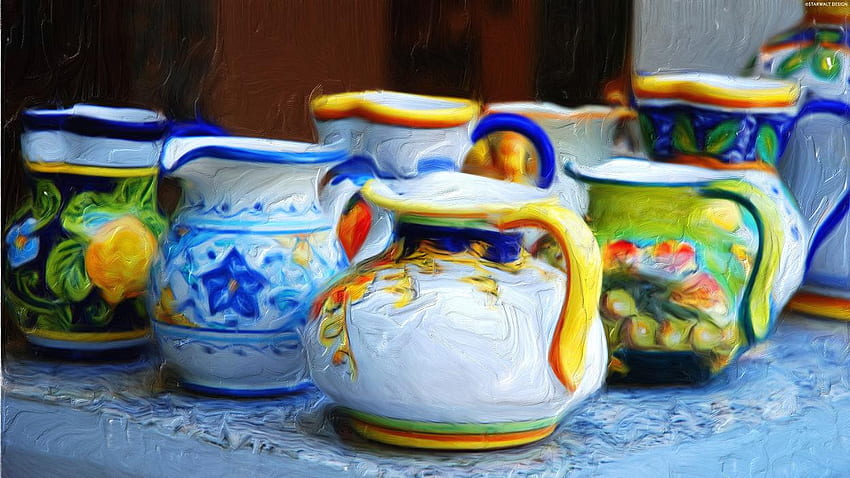
In a world increasingly dominated by mass production, pottery stands as a testament to the beauty and individuality of handcrafted art. It is an age-old practice that melds creativity with functionality, transforming simple clay into vessels of expression and charm. Whether it’s the delicate curves of a porcelain bowl or the rustic finish of earthenware, each piece tells a story steeped in tradition and personal touch. The magic of pottery lies not only in the physical forms created but also in the emotions evoked through the craftsmanship involved.
At Amitābha Studio, this philosophy comes to life through the meticulous creation of unique lamps, each a masterpiece in its own right. Specializing in antique and vintage Delft and other Dutch and Belgian pottery, the studio captures a rich tapestry of art history and cultural heritage. Every lamp embodies a narrative, weaving together elements of the past with the warmth and illumination needed in our modern lives. This intertwining of history and contemporary functionality invites us to not only admire these pieces as art but to also engage with them in our daily routines.
The History of Delft Pottery
Delft pottery, also known as Delftware, originated in the city of Delft in the Netherlands during the 16th century. This distinctive blue and white ceramic style emerged as a response to the popularity of Chinese porcelain imported via trade routes. Dutch potters sought to replicate this exquisite porcelain, leading to the development of their unique techniques and styles. The initial ceramics produced in Delft were tin-glazed earthenware, characterized by their glossy finish and vibrant blue and white designs.
Chinoiserie Lamp
Throughout the 17th century, Delft became a pivotal hub for pottery production, supported by the flourishing Dutch Golden Age. Artisans experimented with various motifs, drawing inspiration from the natural world, biblical scenes, and Dutch landscapes. This period saw the rise of renowned Delftware factories, with many artisans adopting their own signature styles. The pots, plates, and decorative pieces produced in this era became highly sought after, both domestically and abroad, leading to a reputation that continued to grow.
By the 18th century, Delft pottery faced stiff competition from imported porcelain but adapted by diversifying its designs and techniques. Potters began incorporating elements from other European styles and developed new products, such as tiles and more intricate tableware. Despite the challenges, Delftware has maintained a treasured place in the world of ceramics, embodying both historical significance and artistic mastery, making it a beloved choice for collectors and enthusiasts alike.
Craftsmanship at Amitābha Studio
At Amitābha Studio, craftsmanship is not just a skill; it is a passion that permeates every piece created. The artisans dedicate hours to hand-selecting antique and vintage Delft pottery, known for its exquisite detail and history. This careful curation ensures that each lamp is not only a functional object but also a work of art that tells a story. The process of transforming these unique pieces into one-of-a-kind lamps involves precision and a deep respect for the materials used.
The meticulous attention to detail is evident in every lamp produced at the studio. Artisans focus on maintaining the integrity of the antique pottery while skillfully adapting it into a new form. This delicate balance involves both innovation and tradition, where modern techniques complement age-old methods. From the intricate glazing to the final assembly, every step is handled with care, resulting in lamps that reflect the beauty of their origins.
Moreover, Amitābha Studio’s commitment to sustainability shines through its craftsmanship. By repurposing vintage pottery, the artisans contribute to a more sustainable and eco-friendly approach in their creations. This dedication to preserving the past while crafting the future resonates deeply with customers, who find joy in owning pieces that embody both artistry and environmental consciousness. Each lamp from Amitābha Studio serves as a beacon of light and history, illuminating homes with their unique charm and character.
Unique Designs and Inspirations
Amitābha Studio stands out in the realm of pottery with its exquisite collection of unique lamps. Each piece is a celebration of craftsmanship, meticulously handcrafted from antique and vintage Delft and other Dutch and Belgian pottery. The rich cultural heritage of these ceramics shines through in every lamp, reflecting the artistry and tradition that has defined these materials for centuries. By selecting such distinctive sources, the studio intertwines historical significance with modern functionality, creating lamps that serve as both light sources and art pieces.
The inspirations behind the designs at Amitābha Studio draw from diverse influences, ranging from traditional Dutch motifs to contemporary aesthetics. The artisans at the studio infuse their creations with a spirit of innovation, pairing age-old techniques with fresh ideas. This fusion results in lamps that are not only visually striking but also rich with stories and memories from a bygone era. The careful selection of each ceramic piece ensures that no two lamps are alike, making every item a unique treasure.
These lamps not only illuminate spaces but also inspire conversations and spark connections. Each design invites admiration and appreciation, encouraging observers to delve deeper into the history encapsulated within. As they grace homes and galleries, the lamps from Amitābha Studio serve as reminders of the beauty that lies in individuality and craftsmanship, fostering a renewed appreciation for the art of pottery.
Sustainability in Pottery
Sustainability in pottery has become an essential consideration for both artisans and consumers. The process of creating ceramics requires significant resources, but there is a growing emphasis on reducing waste and utilizing eco-friendly materials. Artisans are now seeking out reclaimed materials, such as antique and vintage pottery, to create new pieces. This not only preserves the craftsmanship of the past but also reduces the demand for new resources. Amitābha Studio exemplifies this approach by specializing in unique lamps crafted from antique Delft and other vintage Dutch and Belgian pottery, thus breathing new life into these historical pieces.
In addition to sourcing materials responsibly, sustainable pottery practices include adopting energy-efficient techniques. Many potters are shifting towards using environmentally friendly kilns, such as those powered by renewable energy sources. Furthermore, some artists are exploring alternative firing methods that minimize carbon emissions. This commitment to sustainable practices allows potters to reduce their ecological footprint while still producing beautiful and functional artworks.
Finally, sustainability extends beyond the production phase; it also encompasses the longevity and usability of the finished products. By creating durable and timeless pieces like the lamps from Amitābha Studio, collectors and homeowners can enjoy pottery that has both artistic and practical value. When consumers invest in well-crafted pottery that lasts, they contribute to a culture of sustainability, minimizing the need for frequent replacements and encouraging a deeper appreciation for artisanal work.
The Impact of Artisan Creations
Artisan creations like those found at Amitābha Studio breathe new life into traditional pottery. Each piece, carefully fashioned from antique and vintage Delft and other Dutch and Belgian pottery, encapsulates a story that connects the past with the present. The uniqueness of these lamps not only serves as a testament to the craftsmanship involved but also provides a distinctive aesthetic that enhances any space. By choosing handmade artisan products, customers are making a conscious choice to support creativity and sustainability, acknowledging the value of skilled artisanship.
Moreover, these creations foster a sense of individuality and personal expression in home decor. Unlike mass-produced items, the lamps from Amitābha Studio stand out for their character and charm, allowing homeowners to curate environments that reflect their personal style and values. Each lamp can spark conversation and admiration, transforming ordinary spaces into showcases of artistic beauty. The blend of heritage and contemporary design resonates deeply with those who appreciate artistry, making these pieces not just functional but also meaningful.
Finally, the impact of such artisan creations extends beyond aesthetic pleasure; it cultivates a deeper appreciation for the cultural significance of pottery itself. By bringing antique elements into modern design, Amitābha Studio helps preserve the rich traditions of pottery-making. This awareness fosters a broader understanding of the artistry involved and encourages a revival of interest in handcrafted goods, ultimately enriching the cultural landscape and inspiring future generations to value and pursue similar craft traditions.
